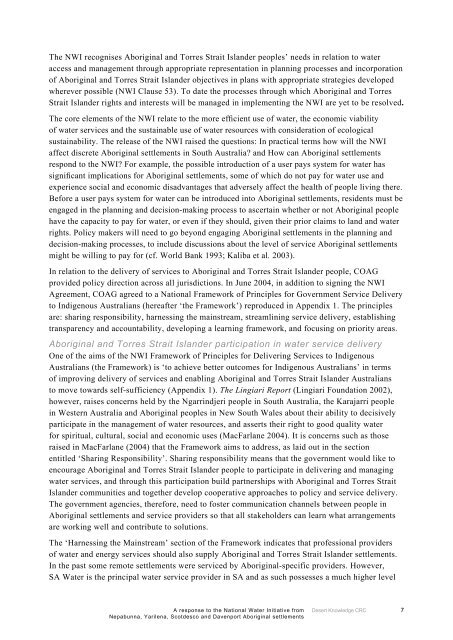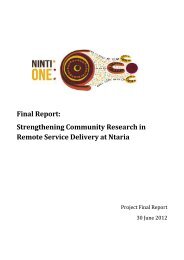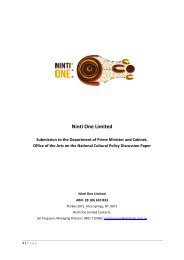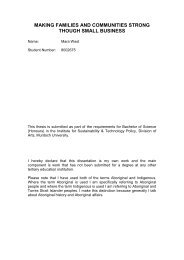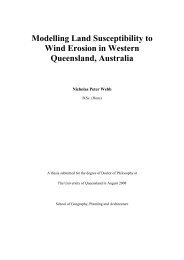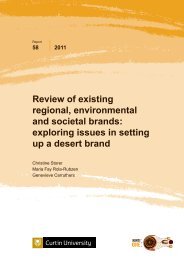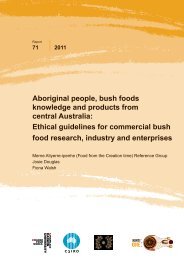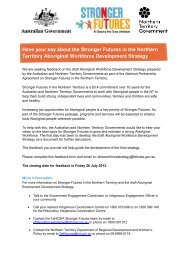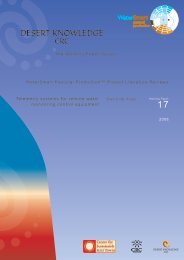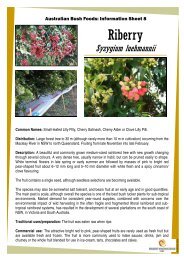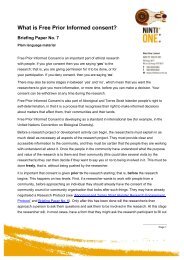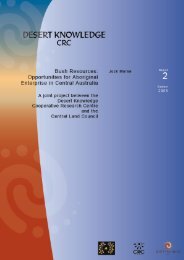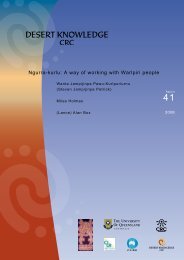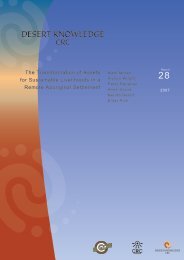A response to the National Water initiative from ... - Ninti One
A response to the National Water initiative from ... - Ninti One
A response to the National Water initiative from ... - Ninti One
- No tags were found...
You also want an ePaper? Increase the reach of your titles
YUMPU automatically turns print PDFs into web optimized ePapers that Google loves.
The NWI recognises Aboriginal and Torres Strait Islander peoples’ needs in relation <strong>to</strong> wateraccess and management through appropriate representation in planning processes and incorporationof Aboriginal and Torres Strait Islander objectives in plans with appropriate strategies developedwherever possible (NWI Clause 53). To date <strong>the</strong> processes through which Aboriginal and TorresStrait Islander rights and interests will be managed in implementing <strong>the</strong> NWI are yet <strong>to</strong> be resolved.The core elements of <strong>the</strong> NWI relate <strong>to</strong> <strong>the</strong> more efficient use of water, <strong>the</strong> economic viabilityof water services and <strong>the</strong> sustainable use of water resources with consideration of ecologicalsustainability. The release of <strong>the</strong> NWI raised <strong>the</strong> questions: In practical terms how will <strong>the</strong> NWIaffect discrete Aboriginal settlements in South Australia? and How can Aboriginal settlementsrespond <strong>to</strong> <strong>the</strong> NWI? For example, <strong>the</strong> possible introduction of a user pays system for water hassignificant implications for Aboriginal settlements, some of which do not pay for water use andexperience social and economic disadvantages that adversely affect <strong>the</strong> health of people living <strong>the</strong>re.Before a user pays system for water can be introduced in<strong>to</strong> Aboriginal settlements, residents must beengaged in <strong>the</strong> planning and decision-making process <strong>to</strong> ascertain whe<strong>the</strong>r or not Aboriginal peoplehave <strong>the</strong> capacity <strong>to</strong> pay for water, or even if <strong>the</strong>y should, given <strong>the</strong>ir prior claims <strong>to</strong> land and waterrights. Policy makers will need <strong>to</strong> go beyond engaging Aboriginal settlements in <strong>the</strong> planning anddecision-making processes, <strong>to</strong> include discussions about <strong>the</strong> level of service Aboriginal settlementsmight be willing <strong>to</strong> pay for (cf. World Bank 1993; Kaliba et al. 2003).In relation <strong>to</strong> <strong>the</strong> delivery of services <strong>to</strong> Aboriginal and Torres Strait Islander people, COAGprovided policy direction across all jurisdictions. In June 2004, in addition <strong>to</strong> signing <strong>the</strong> NWIAgreement, COAG agreed <strong>to</strong> a <strong>National</strong> Framework of Principles for Government Service Delivery<strong>to</strong> Indigenous Australians (hereafter ‘<strong>the</strong> Framework’) reproduced in Appendix 1. The principlesare: sharing responsibility, harnessing <strong>the</strong> mainstream, streamlining service delivery, establishingtransparency and accountability, developing a learning framework, and focusing on priority areas.Aboriginal and Torres Strait Islander participation in water service delivery<strong>One</strong> of <strong>the</strong> aims of <strong>the</strong> NWI Framework of Principles for Delivering Services <strong>to</strong> IndigenousAustralians (<strong>the</strong> Framework) is ‘<strong>to</strong> achieve better outcomes for Indigenous Australians’ in termsof improving delivery of services and enabling Aboriginal and Torres Strait Islander Australians<strong>to</strong> move <strong>to</strong>wards self-sufficiency (Appendix 1). The Lingiari Report (Lingiari Foundation 2002),however, raises concerns held by <strong>the</strong> Ngarrindjeri people in South Australia, <strong>the</strong> Karajarri peoplein Western Australia and Aboriginal peoples in New South Wales about <strong>the</strong>ir ability <strong>to</strong> decisivelyparticipate in <strong>the</strong> management of water resources, and asserts <strong>the</strong>ir right <strong>to</strong> good quality waterfor spiritual, cultural, social and economic uses (MacFarlane 2004). It is concerns such as thoseraised in MacFarlane (2004) that <strong>the</strong> Framework aims <strong>to</strong> address, as laid out in <strong>the</strong> sectionentitled ‘Sharing Responsibility’. Sharing responsibility means that <strong>the</strong> government would like <strong>to</strong>encourage Aboriginal and Torres Strait Islander people <strong>to</strong> participate in delivering and managingwater services, and through this participation build partnerships with Aboriginal and Torres StraitIslander communities and <strong>to</strong>ge<strong>the</strong>r develop cooperative approaches <strong>to</strong> policy and service delivery.The government agencies, <strong>the</strong>refore, need <strong>to</strong> foster communication channels between people inAboriginal settlements and service providers so that all stakeholders can learn what arrangementsare working well and contribute <strong>to</strong> solutions.The ‘Harnessing <strong>the</strong> Mainstream’ section of <strong>the</strong> Framework indicates that professional providersof water and energy services should also supply Aboriginal and Torres Strait Islander settlements.In <strong>the</strong> past some remote settlements were serviced by Aboriginal-specific providers. However,SA <strong>Water</strong> is <strong>the</strong> principal water service provider in SA and as such possesses a much higher levelA <strong>response</strong> <strong>to</strong> <strong>the</strong> <strong>National</strong> <strong>Water</strong> Initiative <strong>from</strong>Nepabunna, Yarilena, Scotdesco and Davenport Aboriginal settlementsDesert Knowledge CRC


